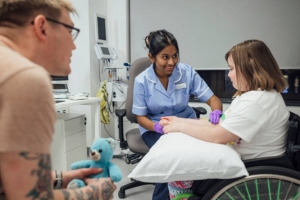Adults in Oxfordshire awaiting an autism diagnosis could face delays of up to 18 years, as the county's main diagnostic service struggles to cope with demand. The Oxfordshire Adult Autism Diagnostic and Support Service (OAADSS) has stopped accepting new referrals since November due to an overwhelming backlog.
Documents reveal that individuals referred after July 2023 may not receive an assessment until 2041. Buckinghamshire, Oxfordshire, and Berkshire West Integrated Care Board (BOB ICB), which oversees the service, has stated it is working to address the delays. Families impacted by the situation have expressed frustration, with one mother, Sarah, sharing how her 19-year-old son’s referral was halted almost immediately due to the closure of the waiting list.
Others, like Hayley from Oxford, have sought alternatives. Her brother faces a seven-year wait for an assessment, prompting her to explore private options via the NHS Right to Choose policy, which allows GPs to refer patients for privately funded assessments covered by the NHS. Hayley highlighted the importance of timely diagnoses, describing knowledge as empowering for those with autism.
BOB ICB acknowledged that demand for autism assessments has risen sharply, driven by greater awareness of the condition. The board stated it is working with OAADSS to find solutions, but families continue to face long waits and uncertainty about the future of local services.
Over the past year, nearly 3.8 million people sought help from NHS mental health, learning disability, and autism services – a rise of almost 40% compared to pre-pandemic levels. Recent NHS data reveals that 3,790,826 individuals engaged with these services in 2023-24, up from 2,726,721 in 2018-19.
Among these figures, over one million children accessed support, with 16-year-olds being the age group most likely to seek help. Alarmingly, one in five 16-year-old girls (70,963) were in contact with mental health services. To address this growing need, the NHS is expanding mental health teams in schools, aiming to provide access to in-classroom support for more than half of all pupils in England by Spring 2025.
Efforts are also underway to review the care provided to patients with severe mental health conditions, ensuring they receive comprehensive and tailored support. Claire Murdoch, NHS England’s National Mental Health Director, highlighted the strides made through increased investment under the NHS Long Term Plan, while acknowledging the work still needed to meet the rising demand.
Baroness Merron, Minister for Mental Health, praised the progress but emphasised the need for shorter waiting times. Plans include recruiting 8,500 additional mental health professionals and implementing early intervention initiatives in schools and communities to tackle the root causes of mental health issues.
Autistica, a leading autism research charity, has launched a free app called the Tips Hub, designed to provide reliable advice to autistic individuals, their families, and professionals working in the field. The app addresses concerns from the neurodivergent community about the overwhelming and often inaccurate information available online.
Developed with input from autistic people, the Tips Hub focuses on the topics they identified as most important. Dr Amanda Roestorf, Director of Research at Autistica and project lead, explained: “The app offers evidence-based, accurate, and practical advice, ensuring users can access trusted information. By centralising resources, the Tips Hub simplifies the search for reliable support.”
The app combines three dedicated hubs into a single resource tailored for distinct audiences. The Everyday Tips section supports autistic individuals and families with advice on topics such as diagnosis, financial well-being, and daily life activities. Professional Tips are designed to help those working with autistic people create inclusive environments, with guidance on better understanding autism. The Mental Health and Wellbeing Tips section offers tools and resources to address mental health challenges, promoting self-advocacy and resilience.
Autistica’s Tips Hub aims to empower the autism community with trusted, practical guidance. Whether for individuals, families, or professionals, the app seeks to improve understanding, inclusivity, and support for autistic people.
Calderdale and Huddersfield NHS Foundation Trust (CHFT) has been commended by NHS England for its innovative approach to addressing elective care waiting lists for patients with learning disabilities. Through targeted initiatives, the Trust has prioritised equitable access and outcomes, ensuring this underserved group receives the care they need.
Using tools such as a learning disability flagging system, a dedicated data dashboard, and comparisons to general population data, CHFT successfully identified and addressed disparities in care. They also established an enhanced task group to prioritise learning disability services, supported by individuals with lived experience, and delivered board-level training on the challenges faced by those with learning disabilities.
Since 2021, CHFT has reduced its waiting list for patients with learning disabilities to zero, ensuring all 77 patients previously waiting for care received treatment. This whole-system approach has led to significant improvements, including reduced hospital stays, fewer readmissions, and better health outcomes. Additional steps, such as partnerships with private dental services and targeted action on waiting lists, have further advanced care provision.
The Trust continues to enhance services with learning disability champions, accessible training for staff, and plans to introduce care navigators. CHFT’s Chief Executive Brendan Brown emphasised the importance of creating sustainable change to tackle healthcare inequalities, improving both patient outcomes and staff satisfaction.
The festive season, while joyful for many, can be a challenging time for those grappling with mental health difficulties, NHS Cambridgeshire and Peterborough has reminded residents. Dr Emma Tiffin, a local GP and mental health clinical lead, has urged anyone feeling overwhelmed by financial pressures, loneliness, or difficult memories to reach out for support. She emphasised the importance of acknowledging these struggles and reminded the community that help is always available.
A wide range of mental health resources are accessible, including online advice, helplines via phone or text, bereavement services, and crisis support. Local initiatives aim to provide tailored assistance for individuals across all age groups, including children, young people, and the elderly. Self-help tools and detailed information about these services can be found on the Keep Your Head website, which offers guidance for both residents and professionals in the area.
Dr Tiffin also highlighted the value of community support during this period. She encouraged residents to check on friends, neighbours, and loved ones, particularly those living alone or struggling with loneliness. A small gesture, such as a phone call or visit, can significantly improve someone’s wellbeing during Christmas.
Further resources and details on mental health support, including NHS 111’s crisis line, are listed on the Cambridgeshire and Peterborough Integrated Care System website, ensuring everyone can access the help they need this holiday season.
A new report reveals funding for pupils with special educational needs and disabilities (SEND) in England has risen by £4 billion over the past five years, with nearly 5% of school pupils now holding an education, health, and care plan (EHCP). However, the Institute for Fiscal Studies (IFS) warns the 60% increase in funding over the past decade has not kept pace with the growing number and complexity of needs, leaving local authorities with a staggering £3.3 billion deficit this year.
The number of pupils with EHCPs has surged by 71% since 2018, adding 180,000 children to the system. While funding has grown, it consistently falls short of high-needs spending, leaving gaps of £200–800 million annually between 2018 and 2022. Increased reliance on costly private placements, averaging £61,500 per pupil per year compared to £23,900 in state schools, has further strained budgets, with local councils turning to private settings due to a lack of capacity in public schools.
Local authorities have been shielded from bankruptcy by temporary measures, but with these protections ending in March 2026, deficits could exceed £8 billion by 2027. The government’s recent £1 billion funding boost is unlikely to bridge the gap, prompting calls for significant reform, including expanding SEND provision in mainstream schools and addressing delays in EHCP assessments.
Darcey Snape, an IFS economist, emphasised the need for a clear long-term strategy to create a sustainable SEND system. While reforms could incur substantial short-term costs, the current approach is financially untenable, making immediate action essential to address rising needs and prevent a postcode lottery in support for vulnerable pupils.
Nearly a third (29%) of neurodivergent employees have experienced workplace discrimination, according to new findings from Autistica’s inaugural Neurodiversity Employers Index (NDEI) Market Insights Report. The research, which surveyed 118 UK companies across 10 sectors and over 6,500 employees - 2,241 of whom are neurodivergent - highlights the challenges faced by neurodivergent individuals in employment and the need for more inclusive workplaces.
The report revealed that only 30% of organisations have clear neuroinclusion strategies, despite one in seven people in the UK being neurodivergent. Conditions such as autism, ADHD, dyslexia, and OCD bring valuable skills and perspectives to workplaces, yet many neurodivergent employees face barriers like inadequate support and limited accommodations. This often leaves them underemployed or struggling to thrive in roles where simple adjustments could make a significant difference.
Autistica’s research highlights a strong appetite among employees for neurodiversity training to better support neurodivergent colleagues. The findings emphasise the need for organisations to offer training, work with neurodiversity experts, and implement readiness schemes to create more inclusive environments. Proactively adopting these practices can unlock a wider talent pool, improve morale, and enhance organisational reputation.
Dr James Cusack, Chief Executive of Autistica, noted the progress made by some companies in fostering neuroinclusive cultures but stressed the need for continued efforts. With growing interest in the next NDEI report in 2025, Dr Cusack expressed optimism that more organisations will adopt tools and strategies to support neurodiverse employees and build truly inclusive workplaces.
The Social Care Institute for Excellence (SCIE) has joined forces with Agilisys, a generative artificial intelligence (AI) provider, to explore innovative ways digital technology can be safely integrated into social care. This collaboration aims to enhance efficiency, reduce costs, and free up social care workers to focus on delivering personalised care by minimising administrative workloads.
Generative AI, which leverages neural networks to analyse data and produce new content, has the potential to revolutionise the sector. By adopting these advancements, care providers can address the growing challenges of inflation, workforce costs, rising demand, and constrained local authority budgets. The initiative seeks to help the social care sector navigate these pressures while maintaining high-quality services.
Kathryn Smith, SCIE’s Chief Executive, emphasised the importance of innovation in overcoming the sector's challenges. She highlighted SCIE’s commitment to working alongside service users to shape effective solutions and strengthen approaches in children’s and family social care. The collaboration with Agilisys aligns with the organisation’s broader mission of driving reform and supporting local projects funded by the Department of Health and Social Care’s Accelerating Reform Fund.
Agilisys CEO Andrew Mindenhall expressed pride in the partnership, combining technological expertise with SCIE’s deep sector knowledge. The joint effort aims to explore ethical considerations and harness AI to deliver better outcomes, improve efficiency, and support the people at the centre of social care services.
Fostering open communication between young people with special educational needs and disabilities (SEND) and the staff they interact with regularly could be key in identifying and preventing exploitation and modern slavery, a new study suggests. Research led by Manchester Metropolitan University, in collaboration with the National Working Group, highlights the heightened risk of exploitation faced by children with SEND and calls for improved early intervention strategies.
The study, Opening Conversations: Improving the Early Identification of SEND Youth at Risk of Modern Slavery in England, included literature reviews, consultations with professionals across sectors, and workshops with SEND young people aged 16-25. Professionals shared insights on recognising risks and initiating conversations, while young participants emphasised the importance of trust and understanding in building connections with staff. The findings underscore the need to move beyond a ‘tick-box’ approach and focus on early prevention rather than reactive measures.
The research identifies barriers such as limited time, inadequate training, and lack of specialised support, and recommends creating environments that promote trust and open communication. Suggestions include training staff to notice subtle behavioural changes, proactive engagement with children, and implementing individualised wellbeing plans. The study also highlights the importance of reducing exclusionary practices and ensuring schools adopt inclusive policies.
Young participants stressed that trusted adults should demonstrate genuine care, respect, and understanding of their individual needs, urging professionals to “know the whole person.” The report calls on government, school leaders, and frontline staff to work collaboratively, with a focus on building “cultures of conversation” to safeguard vulnerable children effectively.
The government has announced a £22.6 million funding boost to enhance the lives of unpaid carers across the UK. The initiative, which will roll out next week under the Accelerating Reform Fund (ARF), aims to better recognise unpaid carers and provide improved support in areas such as hospital services. Among the planned changes are digital carers’ assessments for easier access and schemes offering carers much-needed breaks and greater flexibility.
This allocation is part of the ARF’s broader goal to drive innovation in adult social care. Over the two years from 2023 to 2025, the ARF has allocated £42.6 million in grant funding, with £20 million distributed in the first year. Concerns had been raised over delays in releasing the funds, initially promised in August, with some fearing they might be withheld due to government changes. The delay caused uncertainty for local projects that had already invested in resources and staff in anticipation of the funding.
Minister for Care Stephen Kinnock praised unpaid carers as “the backbone of our care system,” highlighting their critical role in supporting vulnerable individuals. He explained that this funding will empower local authorities to integrate technology and create flexible care solutions. Examples include remote monitoring systems for overnight care in Somerset, Swindon, and Wiltshire, reducing pressure on carers while boosting independence for those in need. Elsewhere, Worcestershire has introduced video technology for post-hospital care, while London has launched campaigns to encourage carers to access support services.
The Social Care Institute for Excellence (SCIE), a key partner in delivering the programme, welcomed the funding, noting that nearly 70% of participating projects focus on carers’ needs. Initiatives range from Lincolnshire’s arts and respite workshops to Medway and Kent’s digital self-assessment tools.

















